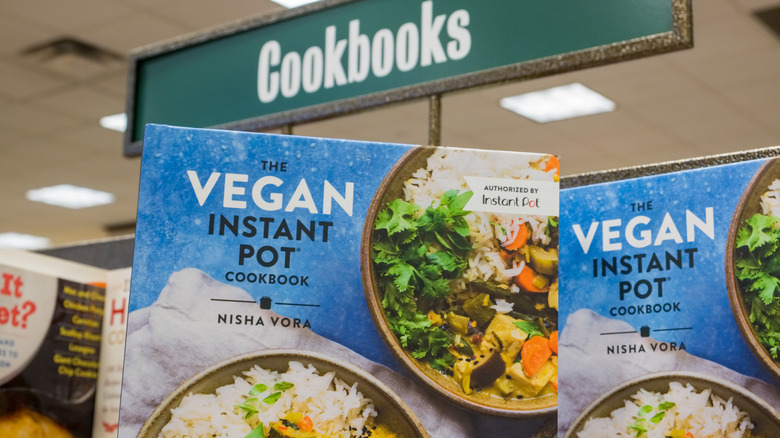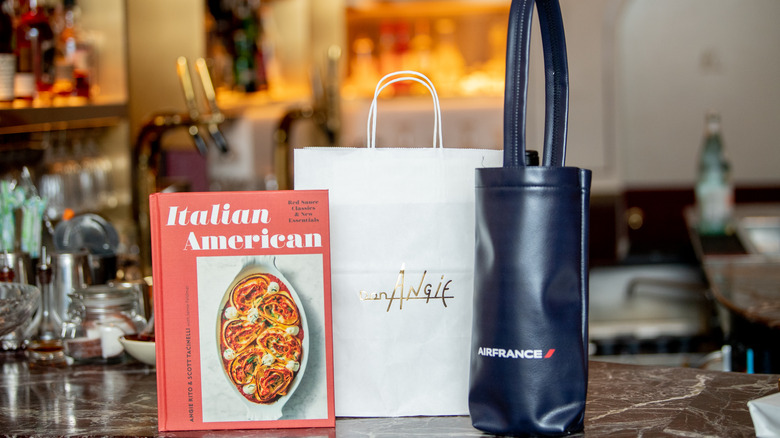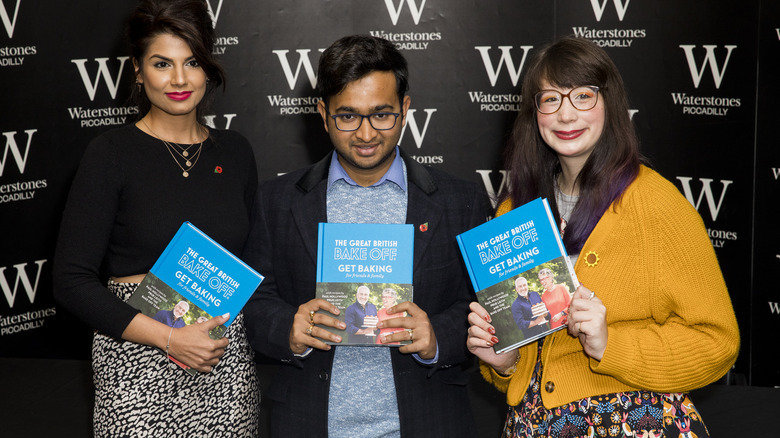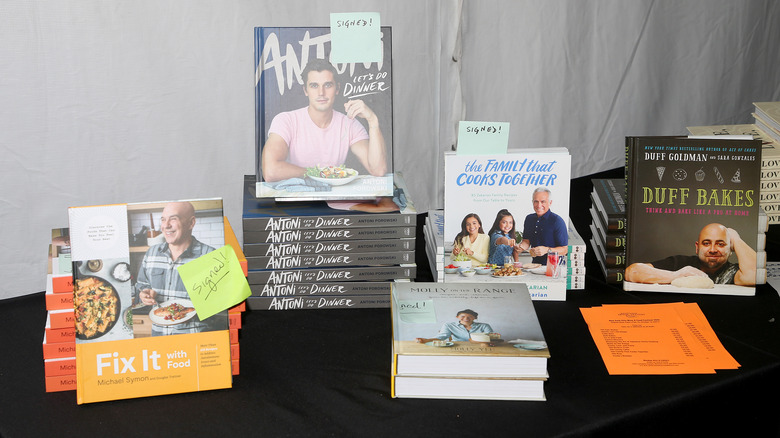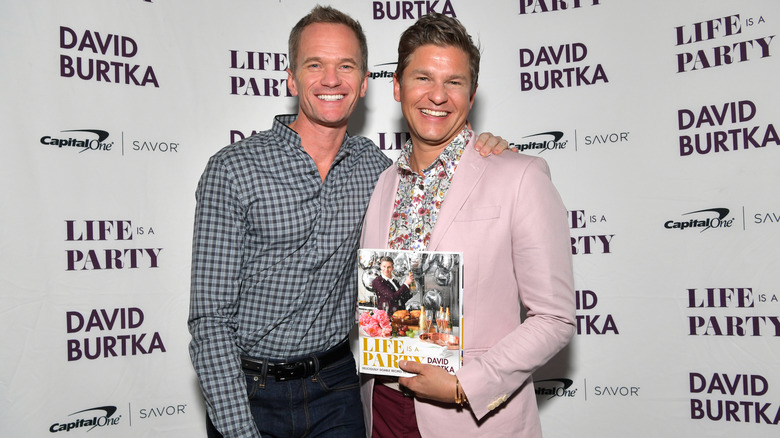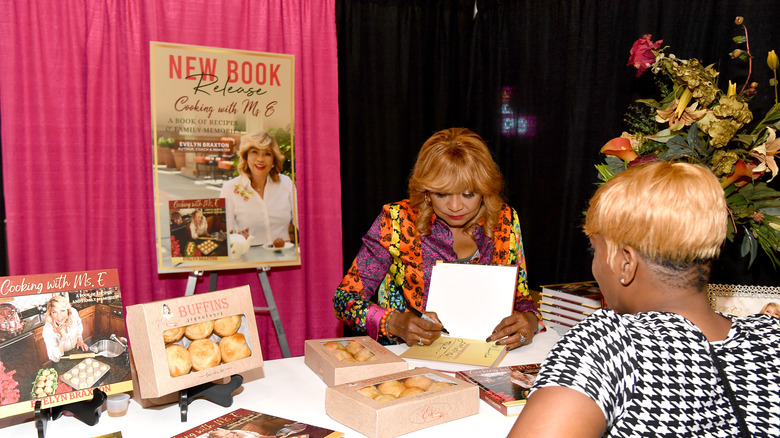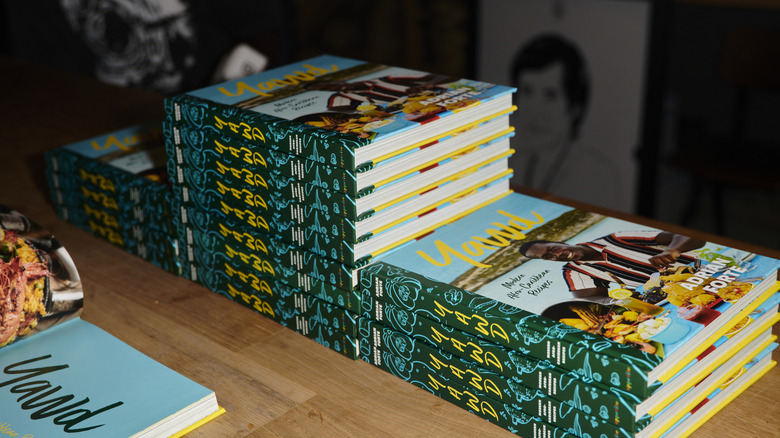The Struggle Cookbook Authors Face In 2022
Life as a cookbook author requires a constant battle with behind-the-scenes headwinds and tailwinds, pressures that readers are oblivious to when they crack open that beautiful and inspiring book and start planning their next meal. Only a year ago, baking-related themes were leading the way to a significant increase in the publication of cookbooks helping people make all that pandemic-inspired oven action (via NPD). But that doesn't mean that it's smooth sailing for authors in the United States, particularly in 2022, when people are now headed back out to restaurants, and home chefs are ready for something new.
From a crowded market to negotiating an excellent contract to nurturing a healthy audience platform, cookbook authors face a daunting list of challenges. Still, it's possible to crack the code and bring a valuable book to the kitchens of home chefs, if an author has the right formula and a pro team on their side. We spoke to a group of experts who shared some of the obstacles that cookbook authors are currently facing and what it takes to overcome them.
Publishing trends are constantly changing
Sales numbers make it seem like cookbook writing is a gold mine, but there is an uphill battle to big success. "According to sales data from NPD, baking books had been trending upward before the pandemic and had a 40% boom in early 2020," says Kim Lindman of Stonesong, a literary agency that specializes in cookbooks and non-fiction. "Probably from all that sourdough everybody was making."
Lindman says that, like fashion, publishing has cycles, and old trends can make sudden reappearances just as fast as new ones die out. "If you look at what's popular and publishing today, publishers bought those proposals probably two years ago," she notes. It's a reminder to authors that chasing fads isn't productive.
"There have been soooo many food books over the last decade," says Janis Donnaud, founder of Janis A. Donnaud & Associates, Inc., an agency that represents food authors and writers. When you consider the constant flow of new titles coupled with the numerous essential cookbooks from decades past, it's no wonder competition is fierce. Donnaud suggests that authors need to be clever in determining a niche or hook that will appeal to editors and readers. "Having said this, there is an enormous on-going opportunity for food books," she adds.
Making a living as a cookbook author is tough
Even authors who have proven career-long stability must remain agile and vigilant to contracts, partnerships, and opportunities. Take Virginia Willis, a chef and James Beard Award-winning cookbook author with six titles to her name. She says that her books allow an opportunity to make money off royalties as well as the advance, which for many authors is spread over the course of years and used to cover expenses relating to the book, such as recipe testing and photography. Yet, even with a healthy amount of esteem tied to her work, she's not actually making a living only as a cookbook author. "My stance is that I do not want to write cookbooks if I can't make a decent wage off writing those cookbooks," says Willis, whose resume also includes writing for Martha Stewart Living, collaborating with Bobby Flay, and working with Michelin-starred restaurants. This has prompted her into conversations that will hopefully secure the highest possible advance for her work.
Willis lays out an example that includes a top-of-the-scale six-figure advance. "If you do the math, $100,000 — minus a modest $20,000 for photography — isn't very much spread out over several years," she explains. "It's hard to make money off of publishing cookbooks." According to Willis, her books are ultimately a "brand extension" and a key marketing tool. "It's authority and really part of my brand platform."
Agents are a big help — if you can get one
One thing that hasn't changed is the process for selling a cookbook to a publisher, a venture that is often best achieved with the guidance of an agent. This person will help an author develop a proposal that will be presented to editors at publishing houses in an attempt to secure an offer for a book deal. According to Kim Lindman, unlike fiction books, the manuscript isn't written until the author contracts with a publisher, at which point the recipes, photographs, and associated content will be developed.
To get the attention of a publisher, "it's vital to have a proposal with a defined concept and strong table of contents," says Lindman. "Yes, this will help sell the book, but it's also a blueprint for actually writing the book, once you've paired up with a publisher."
Virginia Willis says that recipe testing can be the arduous part of putting together a cookbook. "A lot of people crowdsource their testing, but I do not," she says. "I may have other people test my recipes, but if it's in my book, I cooked it, I tasted it, and I'm certain that I tasted the final version."
According to Janis Donnaud, the secret sauce for authors is to do their homework: "Get into business with the right agents, editors, and publishers, and produce work they love."
Celebrity status is preferred
A platform is essentially an existing audience that comes along with the author. According to Janis Donnaud, it's something that publishers are looking for when they consider working with potential writers. "That readership can come from a number of different places, but social media, at this moment, is the one that editors seem to think is the most important for many cookbooks," says Donnaud. A clever idea, related writing outlets, awards, or a notable restaurant opening might also build loyal readers, but social media is today's platform bread and butter.
Donnaud estimates that authors usually will be able to convert around 4% of social media followers into book buyers. That number could perhaps climb to 6% if the author is very proactive in the promotional process. "Every author thinks she or he will be able to get more," she says. "I don't see it happen very often."
The cult of celebrity has always been very important in cookbook publishing, according to Virginia Willis, and this trend continues currently. "It's certainly always been that way you can look back to the '80s with Richard Simmons and Suzanne Somers," says Virginia Willis. She points out that publishers have always been drawn to working with celebrities, thanks to their attached audience. If a chef is also a celebrity, that's even better for business.
The work goes well beyond writing a cookbook
Book publishers lean on authors not only to write and test recipes but to promote their books as well, according to Janis Donnaud. Hours of work and the toll these activities take on the budget can put extra weight on the author's shoulders. Donnaud acknowledges that the equation is "out of whack," but when everything comes together, there is an opportunity for both the publisher and the author to make money. She echoes Virginia Willis in her assessment that books are one of the mightiest ways to build brand credibility for a chef or author.
"Cookbooks are a highly visual and physical medium, so they depend a lot on in-person browsing in brick-and-mortar bookstores," says Kim Lindman. She's noticed that, while fiction or self-help books seem to sell well in e-book format, cookbooks don't seem to enjoy that same flexibility. "The pandemic combined with the paper shortage and supply chain crisis was a hit, but that seems to be slowly turning around."
Despite all the barriers, there is hope
While collecting a social media following might seem like an Augean task, it is an accessible outlet, with no barrier to entry. "An author can build a following without relying on a TV or streaming network, a major newspaper, or the other more traditional modes," says Janis Donnaud.
"While the competition is still fierce, I think getting your work in front of an agent's eye is easier than it's ever been," says Kim Lindman. Even a less than robust social media following can help to keep lines of communication open to help determine the interest of potential readers.
Another modern advantage that authors have in their quiver is self-publishing. Though Virginia Willis acknowledges that this still presents challenges, mainly with distribution, she insists that it's possible to publish a "beautiful, well-designed book that stands shoulder to shoulder" with books put out by well-known publishing companies. "Self-published books don't look like homemade books from Kinko's anymore, they are award-winning books."
There's another booster to accessibility within the publishing landscape: more inclusion. Lindman believes that the current environment is "gradually moving past pigeonholing authors of color into just writing about the food associated with their culture, and opening up to the fact that authors of color can be and are experts in broader categories."
